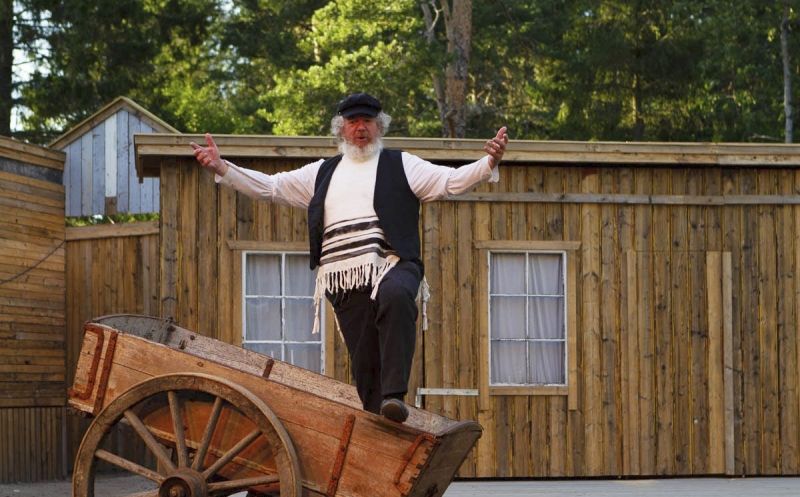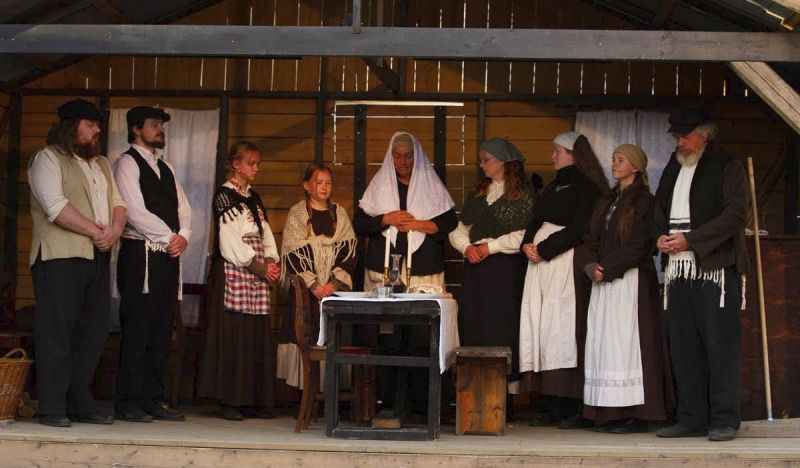Review: FIDDLER ON THE ROOF, Flateby Samfunnshus - Fiddler in the Woods
Enebakk Musikkteater's open-air production of "Fiddler on the Roof" presents an energic cast – and a scenery to die for

.png?format=auto&width=1400) There is nothing amateurish about Enebakk Musikkteater's open-air production of "Fiddler on the Roof" by Jerry Bock and Sheldon Harnick. While some may lack experience in performing, as an ensemble they present a wholesome end-result, with a scenery that is to die for. This review is based on last year's run. It will re-open next week.
There is nothing amateurish about Enebakk Musikkteater's open-air production of "Fiddler on the Roof" by Jerry Bock and Sheldon Harnick. While some may lack experience in performing, as an ensemble they present a wholesome end-result, with a scenery that is to die for. This review is based on last year's run. It will re-open next week.
The story (based on Tevye Tevye the Dairyman and other tales by Sholem Aleichem) centers on Tevye, a milkman in the village of Anatevka, who attempts to maintain his Jewish religious and cultural traditions as outside influences encroach upon his family's lives. He must cope with the strong-willed actions of his three older daughters who wish to marry for love; their choices of husbands are successively less palatable for Tevye. An edict of the Tsar eventually evicts the Jews from their village.
By far the biggest star in this production of the "Fiddler on the Roof" is the outdoor set of Anatevka. To call it a set is a bit of an understatement, as the whole village is realized in all its glory with the forest as a backdrop. This being Norway where the sun sets late in the evening it was truly magical to witness the wedding while 40 local performers sang the famous lines "Sunrise, sunset. Swiftly fly the years. One season following another. Laden with happiness and tears."
Ken Dahle has no troubles filling the outdoor stage with a booming stage presence as Tevye. He has good timing both with the many, many lines of dialogue and with the music, and fits the part like a glove. His wife Golde is realised by Ann-Hege Edvardsen who has no troubles being a strong, decisive mother and wife. She displays a very good chemistry with her husband, and the song "Do you Love Me" is one of the evening's many highlights. Their three oldest daughters are played by Gunn-Bente Pedersen (Tzeitel), Victoria Glenster (Hodel) and Karoline Juliane Knutsen (Chava). They fit their respective parts very well acting wise, but as for their big musical moment being "Matchmaker" left me underwhelmed. This a soprano song and none of them are, so I didn't understand how this song couldn't have been lowered to fit their midrange better and thus given a more Wholesome end result. Mattis Woxen as Motel was wonderfully charming and he also sings pleasingly. Other performers worth mentioning are Eivind Dahle as Percik, Alexander Jahr as Lazar Wolf and Jessica Glenster as Fruma Sara (Who has by far the best voice in the cast).
The large company is made of performers on every level. But the joy of performing shows through and therefore disguises the inexperience in certain of them.
They also portray the villagers as real people, and I am especially pleased that they have made a point out of keeping with the many Jewish customs and traditions displaying them whenever they can. This is far too often missing, especially in amateur productions.
The production is directed by Bjørn Birch who has done a wonderful job of appreciating both the subtleties and marvels of the piece. The show daringly contrasts lightness and darkness. The romantic machinations are shadowed by exile and genocide. He has also added one single dancer (played by Christoffer Lauritzen) who is not "a part" of the ensemble, but is always an outsider who encompasses the emotions being played on stage with a very modern dance style (choreographed by Benjamin Nordin). In certain areas this works wonderfully, while in others they become more distracting and overly illustrative. Especially in Ken Dahle's final song (Chavaleh) is this evident. I felt Dahle's rendition of the song was more than enough to play on the heartstring of the audience.

In 1964, when Fiddler on the Roof premiered in New York, many in the city had suffered exile or bereavement through the Holocaust. When a villager excitedly announces plans to "go to Poland", we know the likely fate of their descendants. Respecting this, Jerry Bock's score defies generic convention by ending not with a chorus line but a silence, stalling a final tune from the title character. The terrifying resurgence of antisemitism and phobias of minority groups makes the musical cruelly topical once more.
Reader Reviews
Videos


